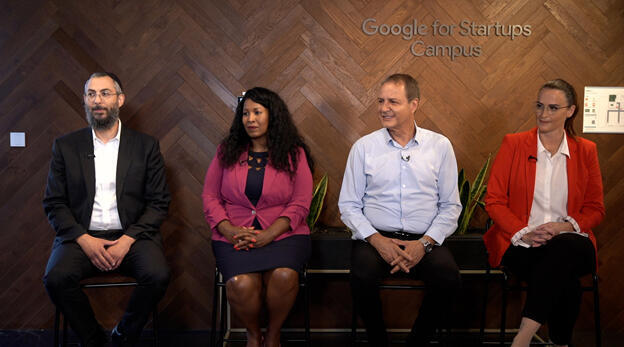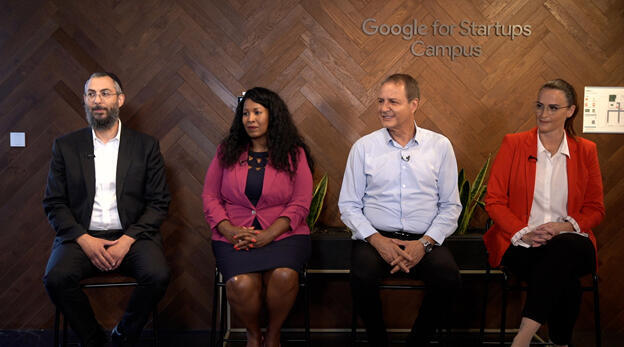
Breaking barriers and building bridges: Israel's high-tech sector moves towards greater diversity
A panel of experts spoke about how to best improve diversity within the local tech sector
"We know that there has long been a shortage of skilled workers as well as a lack of diversity in Israel’s tech sector. This is something that must change," said Gali Shahar Efrat, General Manager of the Google and Reichmann Tech School at Reichmann University, during a panel discussion at Google and Calcalist’s Startup Week. The panel also included Yuval Shalom Ozanna, Co-founder of WalkMe and OZ Software, Oshra Friedman, Deputy Director-General of the Authority for the Advancement of the Status of Women, and Imad Telhami, CEO and Founder of Babcom Centers.
Gali, you explained that at the school, you aim to eliminate barriers. What does this actually mean?
"There are barriers facing specific populations, such as ultra-Orthodox Jews, the Ethiopian community, Arabs, and women. These are the populations we are trying to assist and promote by providing quality education, academically and practically, and by removing numerous obstacles. What does that mean? It means that if you have a cultural issue, we will support you and work with organizations that can help you. If you have an economic issue, we will provide you with scholarships and living stipends. If you have a language problem, we offer preparatory courses in Hebrew and English, as well as mathematics. Essentially, any obstacle that prevents a candidate from integrating, we will find a solution. This way, we hope to help the high-tech industry become what it is supposed to be - enriched and diverse.”
Does this mean lower dropout rates?
"It means low attrition rates. We ran a pilot program and found a high correlation between our admissions tests and job placement rates. We put everyone through our admissions tests to bring them to the same starting point. From our perspective, everyone is equal, no matter their economic background or educational level. As long as you have relevant skills for the role, we provide all the assistance and support to ensure your success in training and integration into the workforce."
Related articles:
Imad, is training enough to increase diversity and integrate more Arabs into the Israeli high-tech sector?
"First of all, the beauty of diversity is like an arrangement of flowers - many colors makes it more beautiful. I think diversity is something that can bring a lot of benefit to anyone engaged with it.
"To your question, when we talk about diversity in the high-tech industry, we shouldn't look back at how it used to be but rather at how it will be in the future. It will be different from what it has been until now. The world is changing. We understand that almost every industry will have some technological element. Take cars - what is a new car? It's a computer on wheels. Or drivers - there will be driverless cars. Who is going to make that happen? There will be people who will provide significant support to this new world that we are not accustomed to, and they don't always have to be engineers who studied software and coding. They can be intelligent individuals who can receive specialized training and do the job.
"The world needs to look forward. Today, at Babcom, we employ close to 5,000 diverse individuals, not just Jews and Arabs, and there is diversity within both the Arab and Jewish communities. It's the most beautiful arrangement of flowers in the country. We also work with 50 high-tech companies, providing them with technical support, including teaching about robotics. The whole world is heading towards robotics. People need to prepare themselves for the future. We train individuals to operate new robots, and I think the future will go in that direction."
Oshra, the present trend in the Ministry of Labor and the government in general is to promote vocational training - non-academic qualifications. Do you, as the Deputy Director of the Authority for the Advancement of Women, believe that this will help increase the percentage of women in high-tech?
"The high-tech industry is progressing on one hand, and on the other hand, we are aware that it faces significant challenges. I think that the combination of vocational training and academia should not be seen as mutually exclusive but rather as complementary options for all parties. Some may be suitable for academia, which is a long process. But what about others?
“However, training alone is not enough. Beyond being culturally adapted and diverse, it should also include integration and ongoing support. Because if, in the end, the employing organization does not have the tools to make relevant adjustments for the population, then we have failed."
Yuval, while there has been progress at integrating the ultra-Orthodox community into the high-tech sector, the numbers have remained low. What do you think is the right model?
"The ultra-Orthodox community is highly diverse. I think the reason why the percentage of ultra-Orthodox individuals integrated into the high-tech industry does not match their percentage in the overall Israeli population is that we have directed the integration of ultra-Orthodox individuals at the top of the pyramid to positions in specific high-tech companies. We have reached very specific segments of the ultra-Orthodox population. We have doctoral students from the ultra-Orthodox community at various places, and ultra-orthodox women at companies like Google, Microsoft, Amazon, and similar companies. But there are quite a few ultra-Orthodox men and women for whom working in these companies is not suitable for one reason or another.
"Therefore, the successful model, in our view, is the approach we achieved in collaboration with the Jerusalem College of Technology, Reichmann University, and Google: to reach as broad an audience as possible within the ultra-Orthodox community and direct them towards areas that are not only high-tech: insurance companies, government offices, HMOs, banks, and all those companies that are not at the top of the pyramid. This allows us to reach a more diverse population within the ultra-Orthodox community and touch almost everyone. The ultra-Orthodox community is very eager to integrate into the population and the workforce."
